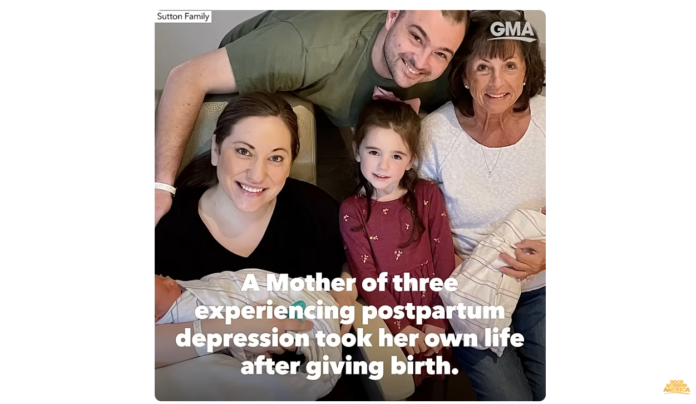“She Just Needed Some Help”
“In her letter, it was clear she was depressed,” Tyler says. “She felt like a burden. But she was anything but a burden. She just needed some help. I wish she had just waited for me to get home so I could have helped her.”
Cases like Ariana’s—where suicide happens so soon after childbirth—are rare but critically important to talk about. Ariana had overcome PPD before, but that didn’t mean her risk was lower. In fact, it was the opposite.
Tyler Sutton doesn’t just want the world to know what an incredible mother Ariana was—he also wants people to recognize the signs of PPD and postpartum psychosis so that no other family has to endure this pain.
The Importance of Mental Health Treatment During Pregnancy
Many experts stress that continuing antidepressants during pregnancy can be safe and beneficial. Dr. Angela Bianco, a maternal-fetal medicine specialist at Mount Sinai Health System, explains:
“All of the data we have to counsel patients is very reassuring. We have a decent amount of retrospective data that seem to be associated with excellent pregnancy outcomes.”
Nicole Warren, an associate professor of nursing at Johns Hopkins, adds:
“When people stop taking an SSRI (antidepressant), they may experience worsening symptoms of depression. That, combined with being postpartum, could lead to a crisis situation.”
Signs & Symptoms of Postpartum Depression
In honor of Ariana’s life, here are signs of PPD from the CDC:
- Crying more often than usual
- Feelings of anger
- Withdrawing from loved ones
- Feeling numb or disconnected from the baby
- Worrying about harming the baby
- Feeling guilty about not being a good mom
Risk Factors for PPD
Some women are at higher risk, including those who:
- Experience stressful life events
- Have low social support
- Have a personal or family history of depression
- Had difficulty getting pregnant
- Are mothers of multiples (twins, triplets, etc.)
- Had a preterm birth (before 37 weeks)
- Experienced pregnancy or birth complications
What You Can Do
The most important thing you can do for a new mom?
Ask, “How are you, really?”
Even if she seems fine, ask. You might save a life.
Tyler Sutton also urges people to start this conversation before birth:
“When newly pregnant women go to their first OB appointment, they should be learning about postpartum depression—the risks and the signs,” he says. “And they should keep having these conversations throughout the pregnancy.”
Ariana’s story is heartbreaking, but it can also be life-saving. If you or someone you love is struggling, please seek help.

